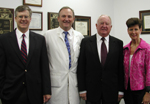Gift establishes new endowed chair in research
MUSC recently established a new endowed chair dedicated to the research of genitourinary cancer, thanks to a philanthropic gift from a resident of Hilton Head Island and his children. From
left are Thorsten Brockmann, urology chair Thomas Keane, Juergen Brockmann,
and MUSC Health Sciences Foundation Board member Paula-Harper Bethea.
From
left are Thorsten Brockmann, urology chair Thomas Keane, Juergen Brockmann,
and MUSC Health Sciences Foundation Board member Paula-Harper Bethea.
Juergen Brockmann and his children, Veronica Erston, Regina Cialdini and Thorsten Brockmann, made their gift to the Department of Urology in memory of their late wife and mother Karin, who died in April 2003 after a long illness.
Karin Brockmann’s physician, urology chairman Thomas Keane, M.D., said the Brockmann Endowed Chair in Urologic Oncology would enable the department to strengthen and accelerate its investigations of genitourinary cancer.
“The Brockmann family has provided us with an invaluable resource in our fight against cancer,” Keane said. “This endowed chair will enable us to attract and retain a world-renowned researcher to pursue new treatments and ultimately a cure for genitourinary malignancies, which include bladder, prostate, renal, and other genitourinary cancers. In that light, ‘generous’ doesn’t begin to describe the contribution the Brockmanns have made to this department.”
Beyond establishing the endowed chair fund, the Brockmann family also provided the Urology Department with additional funding on an annual basis to support high-priority research projects.
Approximately 81,400 Americans died of genitourinary cancer during 2003, according to the American Cancer Society. The group also estimates that roughly 405,300 new cases of these cancers are diagnosed in the U.S. each year. Despite these statistics, patients with genitourinary cancer are experiencing lower mortality and morbidity rates and a higher quality of life than was possible just a few years ago, thanks to ongoing medical research.
Still, the statistics remain, said Keane. “As long as patients continue to suffer from these cancers, we are compelled to search for new ways to prevent, detect, diagnose, and treat them,” he said. “This endowed chair provides us with a way to do that in perpetuity.”
What is an endowed chair?
In the early history of universities, chairs were somewhat rare pieces
of furniture. Only upon attaining the rank of tenured professor did a faculty
member earn the privilege of having a chair, which often was provided by
a generous benefactor.
Through time, these chairs came to symbolize the level of support for the work of an acclaimed educator, researcher, or clinician.
Today, the endowed chair provides a means whereby the university may recruit and retain a nationally prominent clinician, helping move an already excellent program into a position of true preeminence.
An endowed chair is established through a major philanthropic gift from a benefactor such as Juergen Brockmann. Once established, the chair is permanent. The principal remains in a professionally managed fund, earning income that is used to attract and/or retain a leading educator or researcher to collaborate with and mentor students and faculty members.
Established in memory of Karin Brockmann, The Brockmann Endowed Chair of Urologic Oncology will allow the Department of Urology to attract knowledgeable and experienced faculty, build the appropriate infrastructure for further discovery, and promote more extensive collaborations within the Medical University and the southeast region.
Ultimately, this chair will allow the department to enhance its basic
and clinical science research efforts, continue ongoing clinical trials,
and develop new and novel projects in combination with the basic research
departments at MUSC, eventually leading to breakthrough therapies in urologic
oncology.
Friday, June 4, 2004
Catalyst Online is published weekly, updated
as needed and improved from time to time by the MUSC Office of Public Relations
for the faculty, employees and students of the Medical University of South
Carolina. Catalyst Online editor, Kim Draughn, can be reached at 792-4107
or by email, catalyst@musc.edu. Editorial copy can be submitted to Catalyst
Online and to The Catalyst in print by fax, 792-6723, or by email to petersnd@musc.edu
or catalyst@musc.edu. To place an ad in The Catalyst hardcopy, call Community
Press at 849-1778.